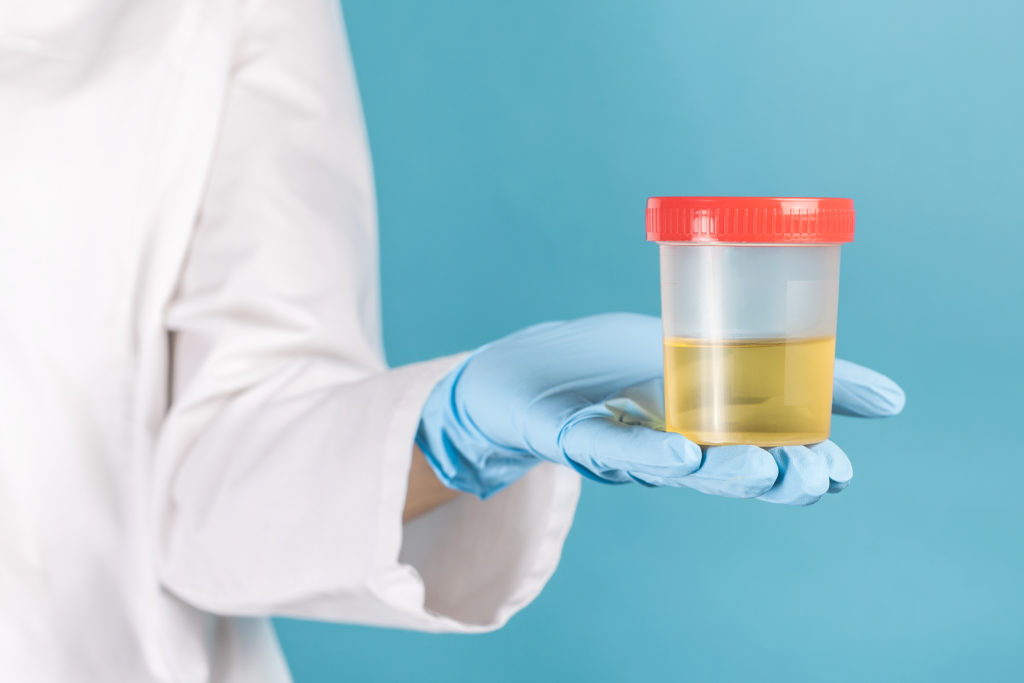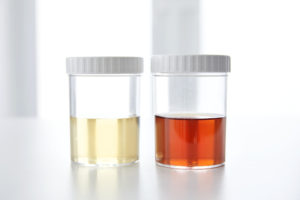
At some point in your life you've heard, "Just pee in this little cup..." or some variation of this phrase and complied without question. Can the truth about your health really be revealed filling a cup up to that all-important line? Yes!
With just one sample, your doctor can check for high protein levels, an indication of inflamed kidneys and possibly multiple myeloma (a form of bone marrow cancer); sugar and keotone, signs of uncontrolled diabetes; and even red or white blood cells, which means there is blood in your urine and sign of a possible urinary tract infection or kidney disease.
Yellow is often the color associated with urine, but it isn't the only shade. Certain medications and your diet can affect the color, but using the colors below will help you decode the message your body is trying to send and whether you need to seek a doctor's care.
Transparent/No color
You are very well hydrated, maybe even TOO hydrated! There's nothing wrong with being on your water game this much (you must be taking the Gallon Water Challenge, huh?), but you don't have to be. It's okay to cut back a little.
Cloudy
Cloudy urine can be a sign of a urinary tract infection. It can also be a symptom of some chronic diseases and kidney conditions. Sometimes, cloudy urine can be yet another sign of being dehydrated.
Cloudy urine with foam or bubbles is called pneumaturia. This can be a symptom of serious health conditions (scroll down to foamy urine for further details).
Pale Straw Color/Transparent Yellow
This is a normal, healthy color for your urine and shows you're getting enough water. Good job!
Dark Yellow
The color of “typical” urine falls on the spectrum of light yellow to a deeper yellow color. During this stage you may need to start drinking more water soon to ensure that you're hydrated.
Having a lot of B-vitamins in your bloodstream can cause urine to appear neon yellow.
Amber Or Honey
It could be something you ate that could be turning your urine this reddish-brown color.
While urine that’s this color might be from something you ate recently, there are sometimes other causes. Some health conditions can cause blood to appear in your urine, including:
- enlarged prostate
- kidney stones
- tumors in the bladder and kidney
Also, your body could be telling you it isn't getting enough water. Increase your intake immediately.
Brown Ale Or Syrup
In most cases, urine that’s dark brown indicates dehydration. Dark brown urine can also be a side effect of certain medications.
A condition called porphyria can cause a buildup of the natural chemicals in your bloodstream and cause rusty or brown urine. Dark brown urine can also be an indicator of liver disease
Be sure to increase your water intake and...
...see your doctor if this color persists.
Pink To Reddish
Don't be alarmed just yet! Maybe you've eaten beets or blueberries recently, in which case, this tint is normal. However, this color could be a sign of blood in the urine, prostate issues, or Urinary Tract Infection (UTI). Monitor your diet and check with your doctor if the color doesn't clear up or is accompanied by pain.
Foaming Or Fizzing
Excess protein in your diet could cause this and it's harmless if you notice it occasionally. If this has become your new normal, see your doctor, as this could be a sign of a kidney problem.
Reviewed by: Dr. Melvin Gaskins
Visit the BlackDoctor.org Whole Health Living center for more helpful articles and tips.
I See Blood in My Urine, Could It Be Bladder Cancer?
 Did you know men are about 3 to 4 times more likely to get bladder cancer during their lifetime than women? According to the American Cancer Society, the estimates for new cases of bladder cancer in the United States is about 81,400. Of that number, 62,100 are men. Although bladder cancer is found twice as often in Caucasians, African American men and women actually have the lowest survival rate.
Did you know men are about 3 to 4 times more likely to get bladder cancer during their lifetime than women? According to the American Cancer Society, the estimates for new cases of bladder cancer in the United States is about 81,400. Of that number, 62,100 are men. Although bladder cancer is found twice as often in Caucasians, African American men and women actually have the lowest survival rate.
The sight of blood in your urine – the toilet water turned a shade of red – is understandably an alarming one. The good news is that it's usually not serious. In fact, even something as innocent as exercise can cause it. But there's a possibility it may also be a symptom of a more serious problem such as cancer, so you should always see a doctor about it.
What is blood in the urine?
Red blood cells (RBCs) in the urine (called hematuria) can be hard to ignore when they turn your toilet bowl pink, bright red, or the color of cola. Intermittent spots of blood in the water may be also be seen. This overt form of blood in the urine is called "gross" or "frank" hematuria. It doesn't take much blood – or about a fifth of a teaspoon – to turn a half-quart of urine an obvious shade of red.
In other cases, the presence of blood may be so minute that it's not visible to the eye. This is called microscopic hematuria, and doctors usually detect it during a routine urine test. Sometimes, what you assume to be blood in the urine may be something else altogether: women may mistake menstrual blood for blood originating in the urine; men may confuse blood in the urine with blood in an ejaculation (which usually suggests a prostate problem).
What causes it?
Blood in the urine can have a variety of causes. As a rule, blood visible to the eye is caused by a problem in the lower urinary tract (ureter, bladder, or urethra), and microscopic blood in the urine usually originates in the upper tract (kidneys).
Here's a list of possible causes:
Kidney and urinary tract problems
-Kidney stones
-Urinary tract infection (cystitis) (Along with kidney stones, UTIs are the most common cause of blood in the urine of people under 40)
-Inflammation of the bladder, urethra, or kidney (called glomerulonephritis)
-Cancer of the bladder, kidney, or prostate
-Injury to the upper or lower urinary tract
-Recent urinary tract procedure, such as catheterization, circumcision, surgery, or kidney biopsy
-Polycystic kidney disease
-Kidney failure (acute or chronic)
-Kidney disease following strep throat (post-streptococcal glomerulonephritis) a common cause of blood in the urine in children
-Medications such as antibiotics (rifampin), analgesics (aspirin), phenytoin, quinine, and blood-thinning drugs like warfarin
Blood disorders
- Hemophilia or other clotting disorders
- Sickle cell disease
- A blood clot in the kidneys
- Low platelet count
The biggest worry with blood in the urine is bladder cancer – the classic patient is an older person who is a smoker and notices blood in his urine but has no other symptoms. These folks need aggressive evaluation.
What should I do?
People with blood in their urine should ALWAYS consult their doctors. If you have a urinary tract infection or a kidney stone, you should drink a lot of water; blood in the urine also means that you should avoid acidic drinks such as coffee, tea, or citrus juices, all of which can irritate the bladder. Depending on the symptoms, a referral to a specialist such as a urologist may be necessary. In addition to blood that may or may not be visible in the toilet, other potential signs of infection may include:
- Unexplained weight loss
- Burning sensation when urinating
- Frequent or urgent urination
- Fever, nausea, vomiting, shaking chills, or pain in the abdomen, side or back
- Inability to urinate
- Passing blood clots through the urine
- Pain during sex or heavy menstrual bleeding
- Dribbling urine, excessive nighttime urination, or difficulty starting to urinate
Although these symptoms may be caused by another health problem, you should consult a physician to find out what the problem is and what needs to be done to treat it.
How can I find out what's causing blood in the urine?
A doctor may order a series of tests to find the cause. These tests may include:
- Urinalysis, an examination of urine for various cells and chemicals
- Blood test, an examination of blood to reveal kidney disease
- Intravenous pyelogram, an x-ray of the urinary tract, which uses a dye to detect a tumor, a kidney or bladder stone, an enlarged prostate, or another blockage of the urine
- Cystoscopic examination, inserting a tiny camera at the end of a tube into the urethra to gain a better view of a tumor or bladder stone
- Kidney x-ray, an x-ray to detect kidney abnormalities
Other tests that may be necessary include: urine culture; a 24-hour urine collection to measure creatinine, protein, and calcium levels; a test for strep throat; a test for the blood disease lupus; an abdominal ultrasound; a computerized tomography (CT) scan of the abdomen; a magnetic resonance imaging, or MRI, of the kidneys and lower urinary tract.
Typically, the patient gets a urinalysis, CT scan, and cystoscopy (done by a urologist). More studies may be added depending on the particular situation and on the findings of these first three studies.
How is blood in the urine treated?
Treatment depends on the cause. In some cases, the origin is not serious, and treatment may not be necessary. If the cause is kidney stones, your doctor may tell you to take pain relievers and drink plenty of water to help pass the stone; sometimes surgery to relieve the blockage is needed. For urinary tract infections, your doctor will prescribe antibiotics for up to two weeks. If it's cancer, early treatment has a chance of a good outcome.
You'll typically be asked to go in for a follow-up appointment one to two weeks later when you'll have your urine tested again. If the problem hasn't cleared up, your doctor may send you to see a specialist.
Prevention
Pay close attention to your body, although there is no sure way to prevent bladder cancer, there are definitely things you should avoid that could potentially put you at a higher risk. Smoking, common workplace chemicals (i.e. rubber, leather, printing, textiles, and paint), diesel and certain hair dyes all contribute to bladder cancer. Our recommendation, drink plenty of liquids and eat lots of fruits and vegetables!








